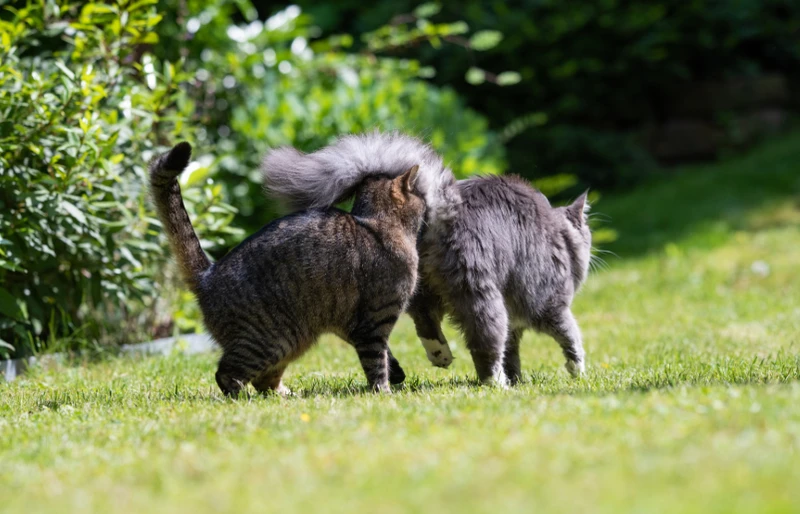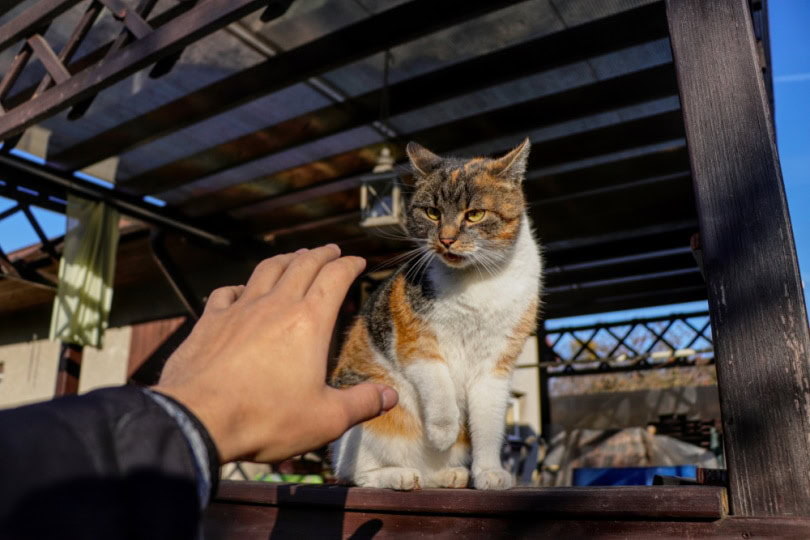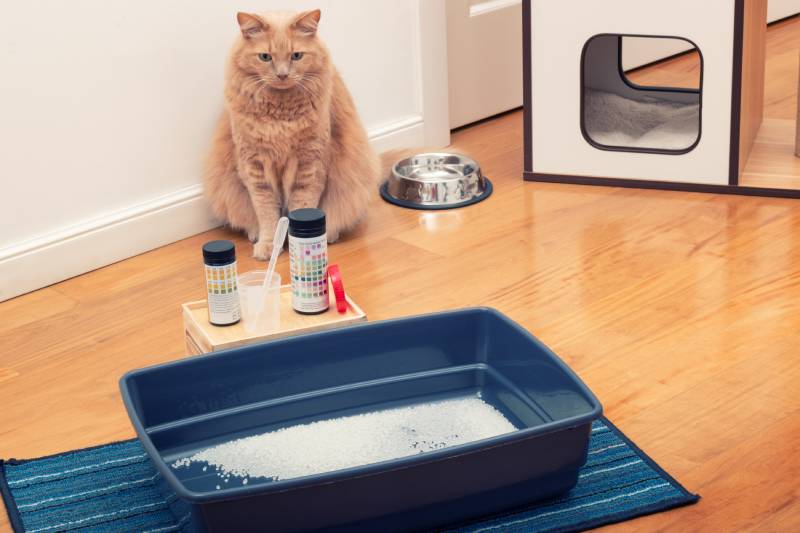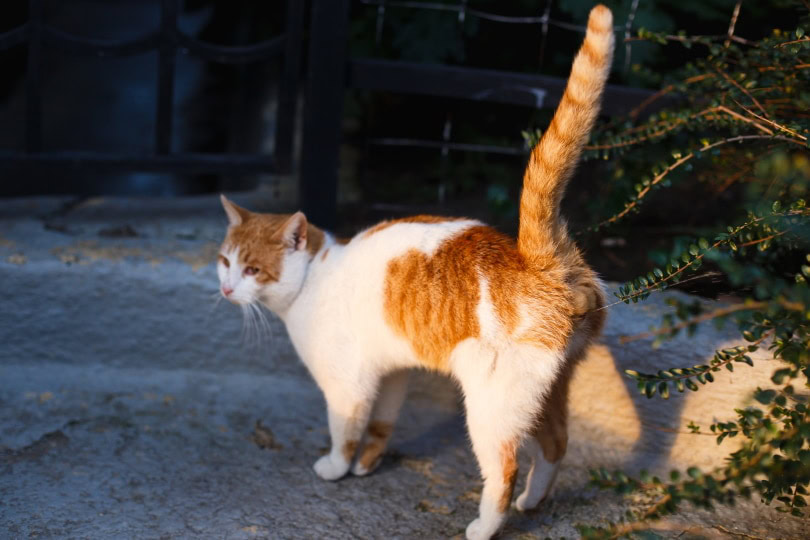VET APPROVED

The information is current and up-to-date in accordance with the latest veterinarian research.
Learn more »Click to Skip Ahead
Cats are not as well known for the ancient art of butt sniffing as dogs, but they also participate in this animalistic ritual. If you watch cats, especially in a group setting, you will pick out subtle butt-smelling. Cats are not as overt or determined about butt sniffing as dogs, but they participate in this ritual for similar reasons. They are trying to gain information and communicate with one another. So why exactly do cats smell each other’s butts? Here are six common reasons that cats will smell each other’s butts and what they mean.

Anal Information
Cats feature two small fluid sacs within their rear ends that secrete a foul-smelling liquid. These sacs are called anal glands. That might sound familiar because dogs also have anal glands. Cat anal glands are smaller and more discreet than a dog’s, and the smells that they give off are more subtle. In fact, most cat feces is covered in secretions from their anal glands that people can never smell because their noses are not strong enough or the smell of the feces itself masks the smell of the anal glands.
It is these anal glands that give off important information that cats can glean from one another by smelling each other’s butts. The fluids that build up in these small sacs contain a whole host of information that cats can pick up on and make decisions regarding other cats. Here are 6 reasons why cats smell each other’s butts and what information they can gain from it.
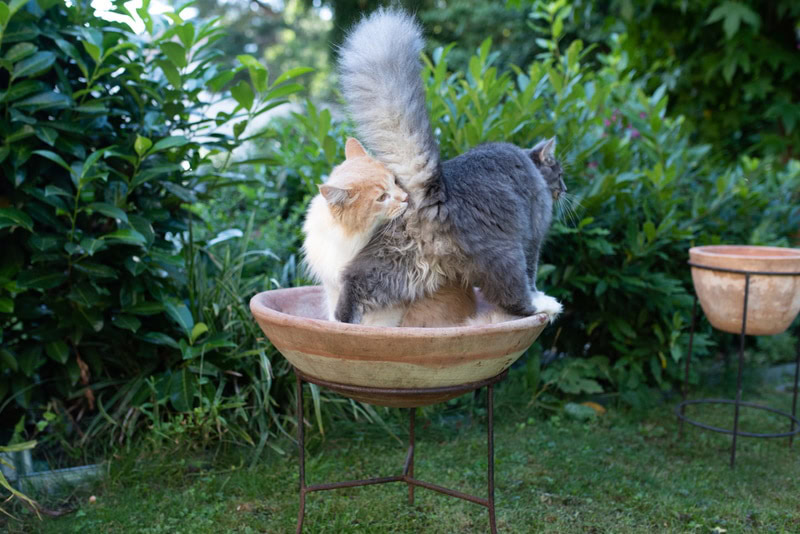

The 6 Reasons Why Cats Smell Each Other’s Butts
1. Greeting and Identification
The simplest reason that cats smell each other’s rear ends is as a simple greeting. Cats that know each other will smell each other as a way to say hello and to identify the other cat. Each cat has their own unique smell, and one quick whiff will tell each cat who the other is. That way, cats can get friendly with cats they know or avoid strange cats that they don’t want to interact with. When cats are feeling friendly and receptive to socialization, they will often lift their tails and show their butts. Sometimes, cats will even do this to their human owners.
2. Sniffing for Enemies
One type of information that cats can get by smelling each other’s butts is to determine if the other cat is a rival, enemy, or threat. If a cat is agitated or scared, it will show up in their scent. When a cat smells another cat and detects strong hormones or pheromones that indicate aggression, it could mean that the cat they are smelling could be a rival or trying to come into their territory. At this point, the cat can decide to move on, defend themself or make a play for dominance (more on that later).
3. Sniffing for a Date
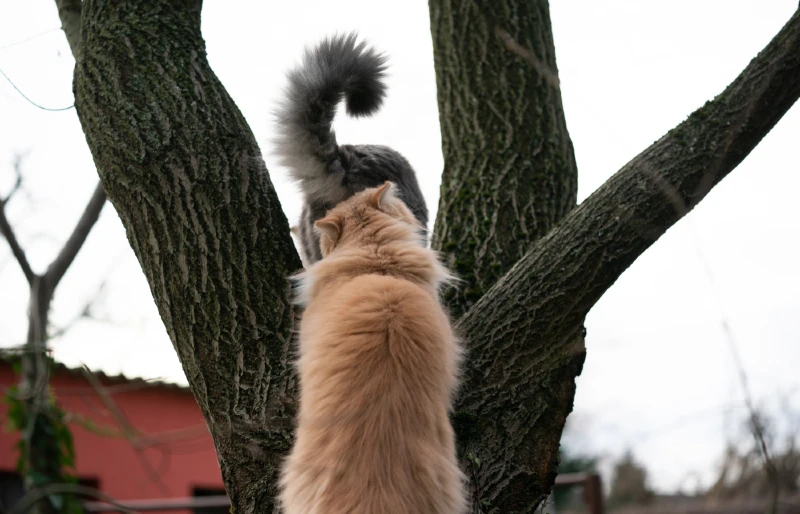
Similar to emitting smells that indicate aggression or that a cat is prowling for new territory, the butt can also emit smells that say that a cat is looking for a date. A cat can sniff butts when they are seeking a receptive mate. This can be done by both male and female cats. Additionally, it is likely that if a cat is off sniffing for a date that they are also emitting their own smells that will let other cats know that they are feeling romantic.
4. Sniffing for Illnesses
Another type of information that a cat can get from sniffing a butt is whether the other cat is healthy or sick. A sick cat will often smell different from a well cat. You can see this in humans, too, when dogs are able to sniff out certain types of cancer with advanced training.
Sick animals smell different from healthy animals. If a cat smells another cat’s butt, they could be trying to determine if they are ill. If a cat discovers that another cat is sick, they could decide to avoid them, or they could potentially exploit their illness to their advantage in the case of seeking new territory or mates. For these reasons, it is important to know whether or not the other cats in the area are sick or healthy.
5. Displaying Dominance
Sometimes the act of sniffing itself can be a tool. Some cats will smell each other as a way to show dominance. If a cat confidently walks up and sniffs another cat’s butt, it is a sign of dominance or a display of the willingness to control the situation. If a cat is trying to display dominance over another cat, it is good to know whether the other cat is feeling anxious, aggressive, or sick. The information they receive from the other cat can help dictate their next set of actions.
6. Displaying Shyness or Submissiveness
In the opposite direction, cats can use the butt sniffing ritual to display shyness or submissiveness. Typically, the more dominant cat initiates the sniffing session. That means that a cat can decide to smell the other cat second in order to convey that they are not making a play for dominance or territory. Some cats just want to be left alone, even when dealing with other cats. By sniffing other cats last, sitting down or taking time to greet and sniff, they can show other cats in the area that they don’t want any trouble.
This type of behavior shows that the actual smell is not the only reason that cats sniff each other’s butts. The sniffing itself can also be used in a complex social system to display both dominance and submissiveness to help communicate social intentions between cats.


Conclusion
Many cat owners like to imagine that their cats are classier and more refined than dogs, but they still will smell each other’s butts in a social setting. Cats smell each other’s butts for a variety of reasons, including information sharing, as a greeting, and as a way to show dominance or submission. This is a completely natural behavior that has evolved as part of a cat’s social dynamics and communication systems.
Featured Image Credit: Nils Jacobi, Shutterstock
